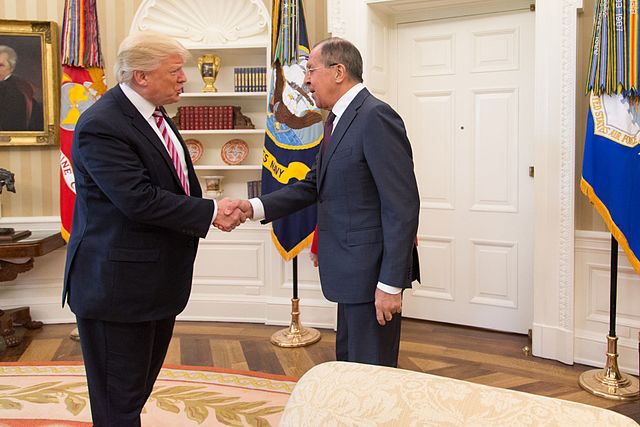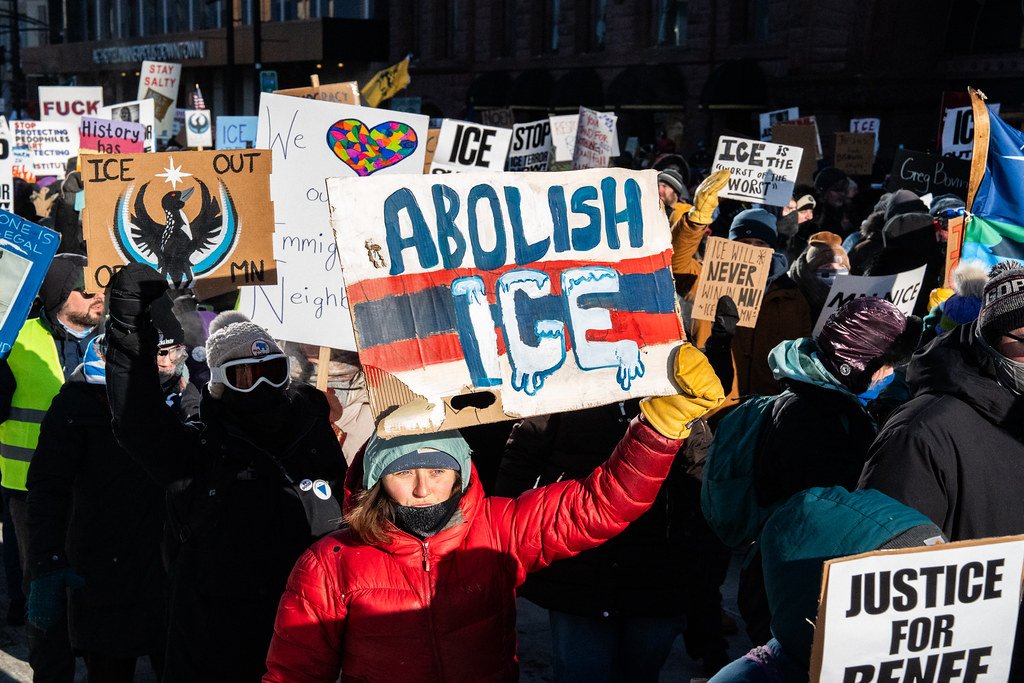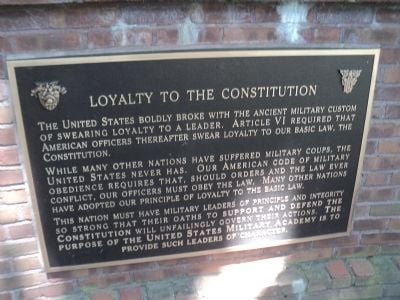On What Grounds Can the FBI Investigate the President as a Counterintelligence Threat?
The New York Times reported on Jan. 11 that the FBI “began investigating whether President Trump had been working on behalf of Russia against American interests” soon after Trump fired FBI Director James Comey in May 2017. In other words, the FBI opened a counterintelligence investigation on the president.

The New York Times reported on Jan. 11 that the FBI “began investigating whether President Trump had been working on behalf of Russia against American interests” soon after Trump fired FBI Director James Comey in May 2017. In other words, the FBI opened a counterintelligence investigation on the president.
The Times reports that my friend and former colleague, former FBI General Counsel James Baker, said during testimony to House investigators in October 2018 that “Not only would [firing Comey] be an issue of obstructing an investigation, but the obstruction itself would hurt our ability to figure out what the Russians had done, and that is what would be the threat to national security.” The Times paraphrases Baker’s testimony as follows: “If the president had fired Mr. Comey to stop the Russia investigation, the action would have been a national security issue because it naturally would have hurt the bureau’s effort to learn how Moscow interfered in the 2016 election and whether any Americans were involved.”
If the story is accurate, then what the FBI did was unprecedented and possibly—I emphasize possibly, since many relevant facts are not included in the Times reporting—an overstep, or at least imprudent. The reason the FBI step might have been imprudent is that it was premised on an inversion of the normal assumptions of Article II of the Constitution.
The FBI defines its counterintelligence responsibilities as follows: “As the country’s lead counterintelligence agency, the FBI is responsible for detecting and lawfully countering actions of foreign intelligence services and organizations that employ human and technical means to gather information about the U.S. that adversely affects our national interests’” (emphasis added). The FBI sees its counterintelligence mission as “identifying and neutralizing ongoing national security threats” (emphasis added). And indeed, this seems to be the FBI’s theory, according to the Times: The FBI opened a counterintelligence investigation of the president because, after Trump fired Comey, the FBI feared that Trump was a threat to the national security interests of the United States.
There is an unobjectionable sense in which the president can obviously be caught up in a counterintelligence investigation. We have known that Trump has been at least peripherally connected to one ever since Comey’s March 20, 2017 testimony, and especially since Deputy Attorney General Rod Rosenstein announced that he was appointing Robert Mueller to conduct a counterintelligence investigation concerning:
(i) any links and/or coordination between the Russian government and individuals associated with the campaign of President Donald Trump; and (ii) any matters that arose or may arise directly from the investigation; and (iii) any other matters within the scope of 28 C.F.R. § 600.4(a).
As David Kris notes, we have long understood that this counterintelligence investigation would sweep up Trump’s relationship with Russia, and might include the question whether Trump might be compromised by the Russians. But the Times suggests that the FBI—at least after Comey was fired—took this investigation in a different direction, at least as a formal matter, based on the premise that the president was a threat to the national security interests of the United States.
It is not unusual for a president to make controversial policy decisions that could, in some quarters, be viewed as causing harm to the national security interests of the United States. For example, many saw George W. Bush’s decisions in the war on terrorism, or Barack Obama’s rapprochement with Iran and Cuba, as harming U.S. national security. Many believe that most of Trump’s foreign policy constitutes a similar threat—his attacks on allies and international institutions, his lies and erratic behavior, and the like. But the FBI obviously would not open a counterintelligence investigation for these matters.
They would not do so because these actions—and indeed the very determination of the U.S. interest in the conduct of U.S. foreign policy—are presidential prerogatives. The Supreme Court has often affirmed, many times since United States v. Curtiss-Wright Export Corp., that it is the president himself, not the executive branch, who possesses “the very delicate, plenary and exclusive power … as the sole organ of the federal government in the field of international relations—a power which does not require as a basis for its exercise an act of Congress.” Moreover, the president has plenary control within the executive branch of the intelligence power and classified information, which is defined, by the president, in terms of harm to national security. In short, the president is the person constitutionally charged with determining what constitutes the national security interest and national security threats for the executive branch, which is where the FBI is located.
Because the president determines the U.S. national security interest and threats against it, at least for the executive branch, there is an argument that it makes no sense for the FBI to open a counterintelligence case against the president premised on his being a threat to the national security. The president defines what a national security threat is, and thus any action by him cannot be such a threat, at least not for purposes of opening a counterintelligence investigation.
On this view of the presidency, the perverse and very controversial steps Trump has taken toward Russia as president—his disclosure of classified information to the Russian ambassador in the Oval Office; his firing of Comey because of the Russia investigation; his persistent refusal to acknowledge what his director of national intelligence described as Russia’s “ongoing, pervasive efforts to undermine our democracy”; and more—are all part of his ultimate discretion to conduct foreign policy and U.S. intelligence operations. Those actions, therefore, cannot pose a threat to a national security as a justification for a counterintelligence investigation. That may sound like an extreme conclusion, but it might follow from Article II, and I think (as I explain below) that not accepting this conclusion leads to equally if not more problematic consequences.
But first: This analysis raises the hard question of what executive branch officials are supposed to do if they have evidentiary reasons to believe the president of the United States is a Manchurian candidate in the sense of being an actual agent of a foreign power seeking to undermine the U.S. government. That is what a lot of Americans think of Trump, and it appears to be what the FBI suspected. Let’s stipulate for purposes of argument that Putin has compromising information on Trump, and that the FBI has Trump on tape unambiguously pledging fealty to Putin and promising to serve as his agent in carrying out a number of concrete orders from the Russian president to damage U.S. intelligence operations (for example, by exposing U.S. spies and U.S. intelligence operations). In this situation (as Chuck Rosenberg asked me in a great episode of the Lawfare Podcast), could the FBI seek a FISA warrant premised on the claim that the president was an agent of a foreign power?
The answer based on the analysis above may be “no,” at least to this extent: the FBI cannot act in a way that is legally premised on second-guessing the president’s national security bona fides. On this view, the FBI can fully investigate Russia’s interference with the 2016 election, including matters involving the president, as it has been doing for a while now. But it cannot cross the line of taking investigative steps premised on the president’s threat to national security. The Constitution leaves crossing that line up to Congress and the American people.
I am not sure this analysis or this conclusion is right—as I note, the situation in unprecedented in many ways. But I am confident that there is an important Article II question lurking here, and I suspect this question is what underlies what the Times twice said was a controversy among former FBI and Justice Department officials about the appropriateness of the FBI’s step.
In this light, the question arises: What turned on the step the FBI took? Did the bureau need to take that step? Was the FBI empowered to do something more and different by opening up a counterintelligence investigation against the president? Did it do so for a practical reason called for by the investigation, in order to ensure that it better understood what happened in 2016? Or was it just a formal bureaucratic step on which nothing of substance turned? This was a question that I raised on the podcast. None of my colleagues could say that anything at all of substance turned on the designation. (It was later suggested to me that the FBI’s step might have enabled enhanced investigative steps against the president; the matter is unclear.) If it is true that nothing of substance turned on the designation, then in one sense the step was meaningless, and the FBI was able to proceed to investigate the president’s connections to Russia and the 2016 election as before. But in another sense the step, even if legally available, was imprudent, for at least two reasons.
First, presidents and their delegates all the time engage in controversial contacts with foreign leaders and with their intelligence agents that sharply change the direction of U.S. foreign policy concerning matters that some critics believe shows undue fealty towards a foreign power. Think of some critics’ view of Nixon’s opening with China or, again, of Obama’s with Iran and Cuba. Or imagine that Rep. Tulsi Gabbard is elected in 2020 and brings controversial foreign policy views to the presidency.
One danger in the what the FBI apparently did is that it implies that the unelected domestic intelligence bureaucracy holds itself as the ultimate arbiter—over and above the elected president who is the constitutional face of U.S. intelligence and national security authority—about what actions do and don’t serve the national security interests of the United States. It further suggests that the FBI claims the authority to take this step on the basis of the president’s exercise of another clear presidential prerogative—the firing of the FBI director in connection with the Russia investigation, which the Times says was the final predicate for the FBI’s action. And it took this step did without any formal guidance on the books for applying counterintelligence rules to the president, akin to the special counsel regulations. Beyond the organizational and legal questions raised by these steps, if the FBI can open up a secret counterintelligence investigation of the president based on its belief that his actions threaten national security, it would chill controversial presidential foreign policy actions that the Constitution says are solely the president’s decisions to make, for better and worse.
Second, as my Lawfare colleague Matt Tait noted, “[Y]ou’d much rather live in a country where elected branches are a check on the national security establishment than the other way around.” I do not doubt the integrity of the contemporary FBI; quite the contrary. But at one time, under J. Edgar Hoover, it secretly collected intelligence information on the president and other elected officials and used that secret information to influence the behavior of those officials. This is an ever-present danger with any intelligence bureaucracy in a democracy. A second adverse effect of the FBI’s counterintelligence investigation of the president is that it gives credence to these types of concerns about the contemporary FBI—especially if the FBI opened a counterintelligence file on the president and did not notify him, as I suspect happened in the Trump case.
In light of these implications, the question is whether the FBI’s step outlined in the Times’s story achieved any affirmative investigative goal. If it did not—if the investigation of Trump could have proceeded as a component of the Russia investigation without the FBI purporting to determine that the president is a national security threat—then this step strikes me as deeply imprudent. To be sure, the Times story also suggested that the decision was made in the confused and uncertain days after the Comey firing, and that it is “unclear whether Mr. Mueller is still pursuing the counterintelligence matter,” whatever that means. (Recall that the events described in the Times story occurred before Mueller was appointed, at about the same time that Deputy Attorney General Rod Rosenstein, in conversations with Acting FBI Director Andrew McCabe, reportedly suggested “that he secretly record President Trump in the White House to expose the chaos consuming the administration, and he discussed recruiting cabinet members to invoke the 25th Amendment to remove Mr. Trump from office for being unfit.”) I hope that there is less to this story than meets the eye: that the story highlights a minor procedural step in a time of perceived crisis that was quickly deemed unnecessary or inappropriate and was reversed or dropped, and that the Times is now making it into a bigger deal than it was and is.
The Times story raises other hard questions. For example, what would happen if Trump, once he learned about the counterintelligence investigation of him, ordered it to cease on the grounds that he deemed it contrary to the national security interests of the United States? Would the FBI cease its investigation, or would it deem the president’s order, like its interpretation of the Comey firing, as further evidence of the president’s threat to the national security interests of the United States? Perhaps the official ordered to end the investigation would at that point resign, or would continue with the investigation until fired by the president. But these questions highlight the fraught position the FBI adopted in opening a counterintelligence investigation of the president based on its leadership’s judgment that he is a threat to the national security.
There are also hard questions on the other side. What exactly is the FBI supposed to do if it stumbles onto unambiguous evidence that the president is compromised, and acting on behalf of a foreign power, and has pledged to that foreign power to blow U.S. assets? As I noted above, I don’t think there is a problem if the FBI, to the president’s knowledge, investigates the president’s actions as a collateral component of a broader counterintelligence investigation of a foreign operation. This has been happening for a while and I see no objection to the Mueller investigation as described in Rosenstein’s order. The dangerous point comes if the FBI opens an investigation of the president, unbeknownst to him, based on its perception of his threat to national security. The line between these two things might be fudgable and the FBI might be able to collect all, or almost all, the information it needs without crossing the line. But it might also be that in some circumstances the only thing the FBI can do is to report what it stumbled upon to Congress and the American people and let them decide what to do.
As David Kris said at the end of the podcast, and I paraphrase here, there is no elegant or satisfying solution to the problem of a president about whom plausible questions are raised concerning his ultimate loyalty to the United States. I also agree with David that the conundrum the FBI found itself in in the spring of 2017 was almost entirely attributable to the president’s norm-defying (to put it mildly) behavior. But there is more at stake than just this president. As I have noted many times, one of President Trump’s most nefarious skills is to act in norm-busting ways that cause people and institutions to respond to him in norm-busting ways. If indeed the FBI took the unprecedented step of opening a counterintelligence investigation directed at the president premised on his threat to national security, I hope the bureau had much stronger evidence for doing so than the Times story provided—and I hope that something of investigative substance actually turned on it. Otherwise, the step strikes me as deeply imprudent.


-(1).jpg?sfvrsn=ccaf7c0_5)


